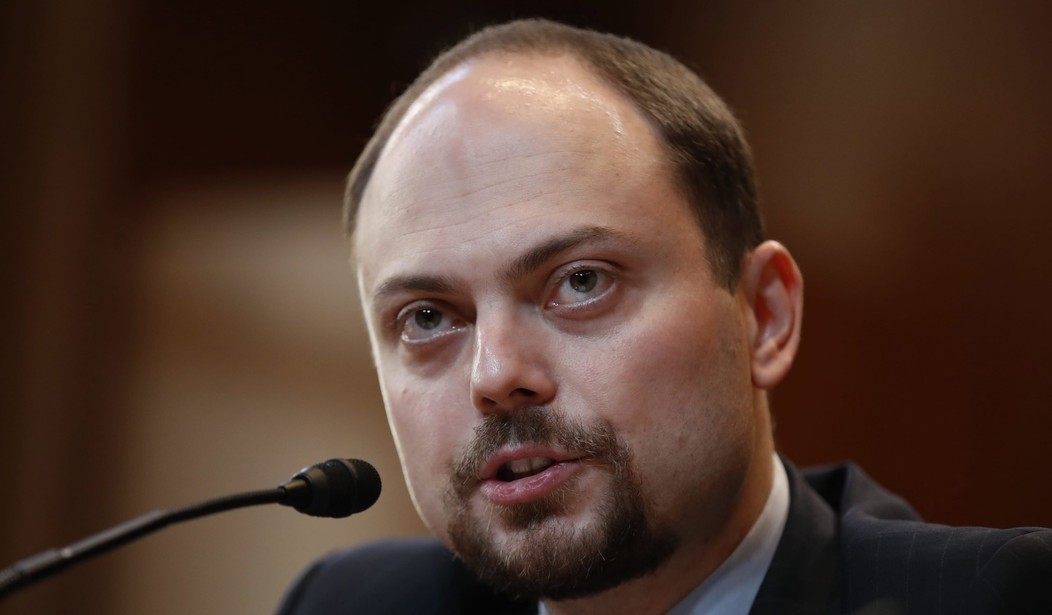WASHINGTON — A Russian dissident recovering from his second poisoning in two years said this morning that massive protests in nearly 100 cities across Russia last Sunday signaled an unstoppable movement driven by the younger generation that has known no other Kremlin leader than Vladimir Putin.
Vladimir Kara-Murza, 35, a journalist who was a close associate of murdered Kremlin critic and opposition politician Boris Nemtsov, is vice chairman of the pro-democracy group Open Russia. Three months after Nemtsov was shot to death within view of the Kremlin in 2015, Kara-Murza suddenly suffered kidney failure and was in coma. It was determined he had been poisoned, and although he recovered the perpetrators were never caught.
On Feb. 2, a day after Kara-Murza posted a Facebook tribute to Nemtsov, it happened again. He was placed in a medically induced coma on life support, suffering from the same symptoms as the first time, and was released from the hospital more than two weeks later.
At an Atlantic Council event today with Senate Foreign Relations Committee Ranking Member Ben Cardin (D-Md.) and Sen. Marco Rubio (R-Fla.), Kara-Murza said doctors gave him about a 5 percent chance of recovery. “I look better than I feel,” he noted, adding doctors warned him of another poisoning that “if you have a third time, that’ll be the last one.”
He is determined to return to Russia after his rehabilitation and full recovery. “I do want to go back and I will go back… our work is important,” Kara-Murza said. “…There’s nothing more the Kremlin would like than for us to give up and we’re not going to give them that.”
Kara-Murza emphasized that the “vast majority of those who came out to the streets of Russia last Sunday were young people… these are the Putin generation who have never known any other political reality.”
This new generation, he said, are getting information from sources other than just state TV and “increasingly recognize” that the Kremlin is damaging their future.
“I have to admit I was surprised about the scale… but I was not surprised about the participation,” he added.
More than a thousand people were arrested during the protests, including key Putin opponent Alexei Navalny, whose Anti-Corruption Foundation estimated the total number of protesters to be around 150,000. “If you watched Russia state TV, you wouldn’t know who Alexei Navalny was,” Kara-Murza noted.
“Mr. Putin and his regime would like the whole world… to think that Russia is just about him and his regime,” Kara-Murza said, adding that the protests gained traction because “people just feel as if the government is wiping its feet on them” and youths in the country have an “instinctive feeling that they want to be citizens.”
He compared what’s happening in Russia to the “revolution of dignity” behind Ukraine’s Orange Revolution.
The protests were driven by anger about government corruption, but weren’t just about that, he added, noting demonstrators chanted “Russia without Putin” and “Russia will be free.”
“It’s really the clash of generations,” Kara-Murza said, and a “heartening” moment for longtime democracy activists. “This is a turning point — primarily, it’s a turning point because of the demographics.”
There are more protests planned for the end of April, he said, and they’re being advertised with a picture of Putin with his mouth covered accompanied by the words “fed up.”
Cardin emphasized that people like Kara-Murza and Nalvany face challenges unknown to American politicians. “We speak out, but we know that we’re safe,” he said, adding that Kara-Murza’s work is “an inspiration to all of us and gives us the energy to pursue these causes in the United States.”
The history of America during this period of time, the senator said, should reflect greatness in promoting universal human rights, democratic institutions and the rule of law.
“We’ve seen that Putin’s ready to attack America — he did attack America… he’s trying to bring down our way of government so he can expand his space,” Cardin added, arguing the U.S. should coordinate with European nations also in Putin’s crosshairs on strategies to protect democratic institutions.
Rubio stressed that Russia has a rich history and culture that transcend the current occupants of the Kremlin.
“It’s not Putin’s Russia, it’s Russia’s Russia… Vladmir Putin just happens to be a tyrant who controls their government,” he said.
Russia, Rubio added, “does not need a tyrant in order to achieve” great things.









Join the conversation as a VIP Member